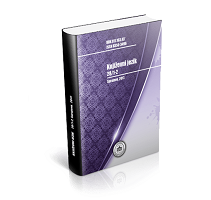O jednom bosnevijskom rukopisu iz porodične biblioteke Abdulaha ef. Maglajlije iz Rudog
On a Bosnevian (Bosnian Alhamyado) Manuscript from the Family Library of Abdulah Maglajlija, an Imam from Rudo
Author(s): Jasmin Hodžić, Elvir MusićSubject(s): Bosnian Literature, South Slavic Languages, Theory of Literature
Published by: Institut za jezik
Keywords: Bosnevian (alhamiyado) litterature; arabic script; hendecasyllabic; a poem about death; Abdulah Maglajlija; mawlid;
Summary/Abstract: Mustafa Maglajlija, son of Abdulah (an imam from Rudo) donated to us the Bosnevian manuscript ”Insansko stanje u času smrtnog nastupanja” (eng. The state of the Human when Death Strikes). Abdulah Maglajlija is known for his service in Foča and Rudo. He was also a correspondent for the Gazette of the Islamic Community and Preporod. Mid-twentieth century, during his service in Foča, Abdulah Maglajlija donated a diwan manuscript by Abdurrahman Džami to the Library of the Gazi Husrev Bey Madrasah in Sarajevo (1953). Moreover, he was one of the first amongst the more contemporary ulema (Muslim scholar) who had written an article on the Prophet Muhammed (in the 1957 Gazette issue). The Bosnevian manuscript ”Insansko stanje u času smrtnog nastupanja” is a 15-page long text in verse form, in approximately A5 format, written in hendecasyllabic verse, in reformed Arebica (use of Arabic script for writing in Bosnian), available as a copy from unknown origin. It also contains subheadings, such as: ”Dušini povici nakon izlaska iz tijela” (Eng. The soul’s cries after leaving the body) (page 5), ”Stanje zemlje đe će se insan ukopati govori” (Eng. The state of the soil where the human is buried speaks) (page 13), or ”Stanje kabura govori” (Eng. The state of the grave speaks) (page 15). The manuscript contains even miniature illustrations before each subheading (1: the place where the corpse is prepared, with a pronounced ewer, page 5; 2: the corpse wrapped in plain cloth (the Kafan), page 12; 3: grave with headstone, page 14). The manuscript’s authorship/localization may be determined more precisely based on its characteristic linguistic features: najdoh (nađoh, Eng. found), izajde (izađe, Eng. went out), izide (iziđe, Eng. went out), unide (uniđe, Eng. went in), postavit (postavljen, Eng. placed), vaske (vas, Eng. plural form of ”you”), etc. The final verses ”zato uv’jek viči la ilahe illallah” (Eng. So always shout La Ilaha Illa Allah) Abdulah compiled trigger further reflections about the possible authorship of the poem, its composition (compilation, success in translation and the like), and/or transcript of a larger integral textual form of which ”Insansko stanje” is just one possible part.
Journal: Književni jezik
- Issue Year: 2022
- Issue No: 33
- Page Range: 83-104
- Page Count: 22
- Language: Bosnian

